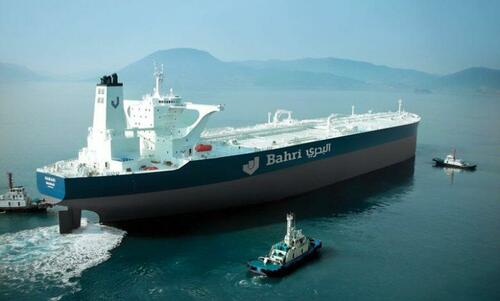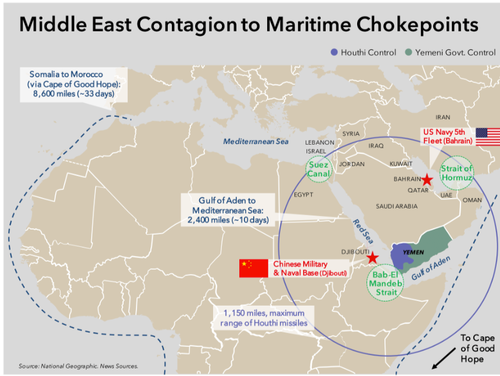Saudi Tankers Given Passage Through Red Sea By Houthis, Alongside Russia & China
China and Russia aren't the only countries being given a "pass" from Yemen's Houthi rebels, but Saudi Arabia is also exporting crude oil through the Red Sea as if in perfectly normal times (well, almost).
At a moment that especially Western and any and all Israeli-linked vessels are being targeted by rocket and drone attacks out of Yemen, the head of Aramco’s refining, oil trading and marketing division Mohammed Al Qahtani has confirmed to Bloomberg, "We’re moving in the Red Sea with our oil and products cargoes." He added that the risks remain "manageable".
Illustrative file image, via Splash247
As we've been chronicling, a who's who of major tanker and container shipping companies have halted their Red Sea transit, instead opting for the much longer journey around the Cape of Good Hope in Africa. This typically adds some $1 million to the total transport bill for a tanker, LSEG Shipping Research data shows.
Bloomberg's analysis shows that even at this very moment in which US warships are coming under fire, Saudi transit through the vital waterway is alive and well:
In the first half of January, Aramco shipped as much crude from its Red Sea terminal at Yanbu northwards toward Europe as it did in the whole of the previous month, vessel tracking data compiled by Bloomberg show.
“That is also giving us huge access and optionality,” Qahtani said. “We are assessing that almost on a daily basis.”
Still, like the rest of the industry, Aramco is having to deal with fewer vessels willing to travel into the Red Sea and higher insurance costs for doing so.
In what was no doubt meant as a message adding insult to injury to the Israel-friendly Western allies, the Iran-linked Houthis starting over a week ago declared that Chinese and Russian-flagged or owned vessels would not be attacked in the Red Sea.
On January 19 a senior Houthi official, Mohammed al-Bukhaiti, mentioned these US rivals by name in an interview with the Russian outlet Izvestia. "As for all other countries, including Russia and China, their shipping in the region is not threatened," he said, stipulating this will remain in effect as long as they are not linked to Israel or its supporters.
Some of the vessels which have come under attack thus far actually have connection to various dozens of countries which aren't necessarily backing Israel's assault on Gaza (though these ships may have been headed toward Israeli ports), but ships with Russian or Chinese ownership, or deep ties, have yet to be attacked.
The US-UK coalition patrolling the Red Sea has at this point launched at least eight or nine significant rounds of airstrikes against Houthi positions, but this appears to have only deepened Houthi resolve.
As for Russia and China, they've been foremost among Washington's powerful rivals to criticize Israel's mass bombing of the Gaza Strip. They both have close ties with Iran, as well as with Assad's Syria, and China is busy inking multi-billion dollar infrastructure and energy deals with Iraq. Of course, these 'defiant' countries (Syria and Iran) are under US sanctions as well.
Iran and Saudi Arabia recently achieved rapprochement and established diplomatic ties, which perhaps explains why Riyadh is now getting a 'free pass'.
More By This Author:
Beijing Set To Refill Strategic Oil Reserve After Draining It For Most Of 2023
Auto Insurance Rates Soar At Fastest Pace Since 1970s Inflation Spike
Bank Bailout Fund 'Arb' Usage Soars (Again) Amid Money-Market Fund Outflows, Large RRP Drain
Disclosure: Copyright ©2009-2024 ZeroHedge.com/ABC Media, LTD; All Rights Reserved. Zero Hedge is intended for Mature Audiences. Familiarize yourself with our legal and use policies every ...
more




